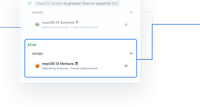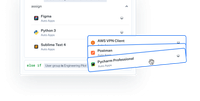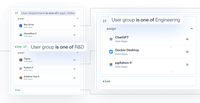Bring control without the chaos
Why Assignment Maps
Assignment Maps are a powerful way to visually define a grouping of apps and configurations to be assigned to devices. There is no ambiguity or opportunity for conflicts.

Bring clarity to your fleet
Assignment Maps give you a clear picture of what controls are active on every device, every time. No matter how complicated the deployment or how twisty the assignment logic, inherent priority and conflict management deliver predictable, consistent results.

Reduce your troubleshooting load
Instantly trace the chain of assignment logic to see which configurations were pushed to a device and why. See a clearly highlighted path through your map of logic and assignments.

Make changes without friction
Whether you’re testing a new OS version, or trialing a new app or tool, Assignment Maps let you easily carve out test groups and stagger deployment to minimize disruption for your team.
The Assignment Maps difference
Reimagine how you manage devices. Instead of groups of rules and payloads, work within an infinite canvas that can hold all your creativity and logic.
Designed to help your team do more

Exclusive assignment
Every device will only ever be assigned a single Assignment Map, eliminating the conflicts and collisions of group-based approaches.
Conditional logic
Assignment Maps automatically determine which devices get which apps and settings through conditional logic based on device attributes, tags, or user data.

Conflict-avoiding hierarchies
Need an operating system or an app configured in different ways for different groups? You can use more than one of any type of Library Item in an Assignment Map. The map chooses whichever is farthest to the right to apply to the device, giving you consistency without conflict.

Nesting
Nested if/else logic allows for increasingly granular targeting of devices for all the situations where only a subset of users or devices need a particular payload.


Device lookup
Look up a device to see the path it takes through the map to reach its end state. Troubleshoot and visualize the results of your rules in real time.
Flexible criteria help your teams get exactly what they need
Create conditional logic with flexible attributes associated with the device or user.

Manage and secure your Apple devices at scale.


